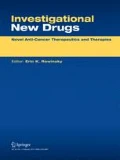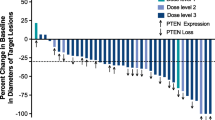Abstract
Introduction. This study was designed to estimate the percentage of objective tumor responses, toxicity profile, and obtain additional information about the plasma pharmacokinetics of thalidomide in patients with refractory and progressing metastatic colorectal cancer. Study design. This phase II clinical trial was conducted according to the two-stage Simon method with the inclusion of consecutive patients. The study protocol was approved by the Institutional Review Board (IRB) of the Academic Hospital (HCPA) of the Federal University of Rio Grande do Sul (UFRGS), Porto Alegre, Brazil. Patients and methods. Seventeen patients with previously treated, refractory progressive metastatic colorectal cancer were eligible. Six patients had prior radiotherapy. The patients had a median of one previous chemotherapy regimen. Patients were initially treated with 200 mg/day of thalidomide with an increase in dose by 200 mg/day every 2 weeks until a final daily dose of 800 mg/day was achieved. Patients were evaluated every 8 weeks for response by radiographic criteria. Plasma pharmacokinetics studies were performed in four patients at 200 mg level and in one patient at 600 mg during the first 24 h. Main outcome measures and results. A total of 17 patients were accrued, all of them being evaluable for toxicity and 14 for response. Thalidomide was well tolerated, with constipation, somnolence, dizziness, and dry mouth being the major toxicities. There were no objective response or stable disease. The median survival was 3.6 months. Single-agent thalidomide is a generally well-tolerated drug that showed no antitumor activity in patients with advanced pretreated metastatic colorectal cancer. Although thalidomide did not show antitumor activity in this patient population, future studies of this agent in patients at initial stages of the disease (when its antiangiogenic properties may be more relevant to disease progression) could be considered.
Similar content being viewed by others
References
Somers GF: Pharmacological properties of thalidomide, a new sedative hypnotic drug. Br J Pharm 15: 111–116, 1960
Lenz W: Malformations caused by drugs in pregnancy. Am J Dis Child 112: 99–106, 1966
McBride WG: Thalidomide and congenital abnormalities. Lancet 2: 1358, 1968
Argiles J, Carbo N, Lopez-Soriano FJ: Was tumour necrosis factor alpha responsible for the fetal malformations associated with thalidomide in the early 1960s? Med Hypotheses 50: 313–318, 1998
Tseng S, Pak G, Washenik K, Pomeranz MK, Shupack JL: Rediscovering thalidomide: a review of its mechanism of action, side effects and potential uses. J Am Acad Dermatol 35: 969–979, 1996
Warren N: Thalidomid capsules (thalidomide) prescription product insert. Celgene Corp, revised August 1998
Olson K, Hall T, Horton J: Thalidomide (N-phthaloyl-glutamimide) in the treatment of advanced cancer. Clin Pharmacol Ther 6: 292–297, 1965
D'Amato RJ, Loughnan MS, Flynn E, Folkman J: Thalidomide is an inhibitor of angiogenesis. Proc Natl Acad Soc USA 91: 4082, 1994
Kruse FE, Joussen AM, Rohrschneider K, You L, Sinn B, Baumann J, Volcker HE: Thalidomide inhibits corneal angiogenesis induced by vascular endothelial growth factor. Graefes Arch Clin Exp Ophthalmol 236: 461–466, 1998
Abeloff MD, Armitage JO, Lichter AS: In: Clinical Oncology, 2nd edn Churchill Livingstone, 2000
McCarty M: Thalidomide may impede cell migration in primates by down-regulating integrin beta-chains: potential therapeutic utility in solid malignancies, proliferative retinopathy, inflammatory disorders, neointimal hyperplasia, and osteoporosis. Med Hypotheses 49: 123–131, 1997
Folkman J: Tumor angiogenesis: therapeutic implications. N Engl J Med 285: 1182, 1971
Wakui S, Furusato M, Itoh T, Sasaki H, Akiyama A, Kinoshita I, Asano K, Tokuda T, Aizawa S, Ushigome S: Tumour angiogenesis in prostatic carcinoma with and without bone marrow metastasis: a morphometric study. J Pathol 168: 257–262, 1992
Srivastava A, Laidler P, Davis RP: The prognostic significance of tumour vascularity in intermediate thickness skin melanoma. Am J Pathol 133: 419–423, 1998
Choi HJ, Hyun MS, Jung GJ, Kim SS, Hong SH: Tumor angiogenesis as a prognostic predictor in colorectal carcinoma with special reference to mode of metastasis and recurrence. Oncology 55: 575–581, 1998
Giatromanolaki A, Stathopoulos GP, Koukourakis MI: Prognostic role of angiogenesis in colorectal cancer. Proc Ann Meet Am Soc Clin Oncol 18: 252, 1999 (Abstract)
Tanigawa N, Amaya H, Matsumura M, Lu C, Kitaoka A, Matsuyama K, Muraoka R: Tumor angiogenesis and mode of metastasis in patients with colorectal cancer. Cancer Res 15: 1043–1046, 1997
Therasse P, Arbuck SG, Eisenhauer EA, Wanders J, Kaplan RS, Rubinstein L, Verweij J, Van Glabbeke M, van Oosterom AT, Christian MC, Gwyther SG: New guidelines to evaluate the response to treatment in solid tumors. J Nat Cancer Inst 92: 3, 2000
Simon R: Optimal two-stage design for phase II clinical trials. Control Clin Trials 10: 1–10, 1989
Eriksson T, Bjorkman S, Fyge A, Ekberg H: Determination of thalidomide in plasma and blood by high-performance liquid chromatography: avoiding hydrolytic degradation. J Chromatogr 582: 211–216, 1992
Figg WD, Raje S, Bauer KS, Tompkins A, Venzon D, Bergan R, Chen A, Hamilton M, Pluda J, Reed E: Pharmacokinetics of thalidomide in an elderly prostate cancer population. J Pharm Sci 88: 121–125, 1999
Teo SK, Colburn WA, Thomas SD: Single-dose oral pharmacokinetics of three formulations of thalidomide in healthy male volunteers. J Clin Pharm 39: 1162–1168, 1999
Simmons BR, Lush RM, Figg WD: A reversed-phase high performance liquid chromatography method using solid phase extraction to quantitative thalidomide in human serum. Ann Chim Acta 339: 91–97, 1997
Singhal S, Mehta J, Desikan R, Ayers D, Roberson P, Eddlemon P, Munshi N, Anaissie E, Wilson C, Dhodapkar M, Zeddis J, Barlogie B: Antitumor activity of thalidomide in refractory multiple myeloma. N Engl J Med 41: 1565–1571, 1999
Fine HA, Figg WD, Jaeckle K, Wen PY, Kyritsis AP, Loeffler JS, Levin VA, Black PM, Kaplan R, Pluda JM, Yung WK: Phase II trial of the antiangiogenic agent thalidomide in patients with recurrent high grade gliomas. J Clin Oncol 18: 708–715, 2000
Escudier B, Lassau N, Couanet D, Angevin E, Mesrati F, Leborgne S, Garofano A, Leboulaire C, Dupouy N, Laplanche A: Phase II trial of thalidomide in renal cell carcinoma. Ann Oncol 20: 718, 2001
Patt YZ, Hassan MM, Lozano RD, Waugh KA, Hoque AM, Frome AI, Lahoti S, Ellis L, Vauthey JN, Curley SA, Schnirer II, Raijman I: Phase II trial of thalidomide for treatment of non-resectable hepatocelular carcinoma (HCC). Proc Ann Meet Am Soc Clin Oncol 19: 266, 2001
Govindarajan R: Irinotecan and thalidomide in metastatic colorectal cancer. Oncology 14: 29–32, 2000
Govindarajan R. Irinotecan/thalidomide in metastatic colorectal cancer. Oncology 16: 23–26, 2002
Chen TL, Vogelsang GB, Petty BG, Brundrett RB, Noe DA, Santos GW, Colvin OM: Plasma pharmacokinetics and urinary excretion of thalidomide after oral dosing in healthy male volunteers. Drug Metab Dispos 17: 402–405, 1989
Bossi P, Viale G, Lee AK, Alfano R, Coggi G, Bosari S: Angiogenesis in colorectal tumors: microvessel quantitation in adenomas and carcinomas with clinicopathological correlations. Cancer Res 55: 5049–5053, 1995
Aotake T, Lu CD, Chiba Y, Muraoka R, Tanigawa N: Changes of angiogenesis and tumor cell apoptosis during colorectal carcinogenesis. Clin Cancer Res 5: 135–142, 1999
Author information
Authors and Affiliations
Rights and permissions
About this article
Cite this article
Dal Lago, L., Richter, M.F., Cancela, A.I. et al. Phase II trial and pharmacokinetic study of thalidomide in patients with metastatic colorectal cancer. Invest New Drugs 21, 359–366 (2003). https://doi.org/10.1023/A:1025485031112
Issue Date:
DOI: https://doi.org/10.1023/A:1025485031112




